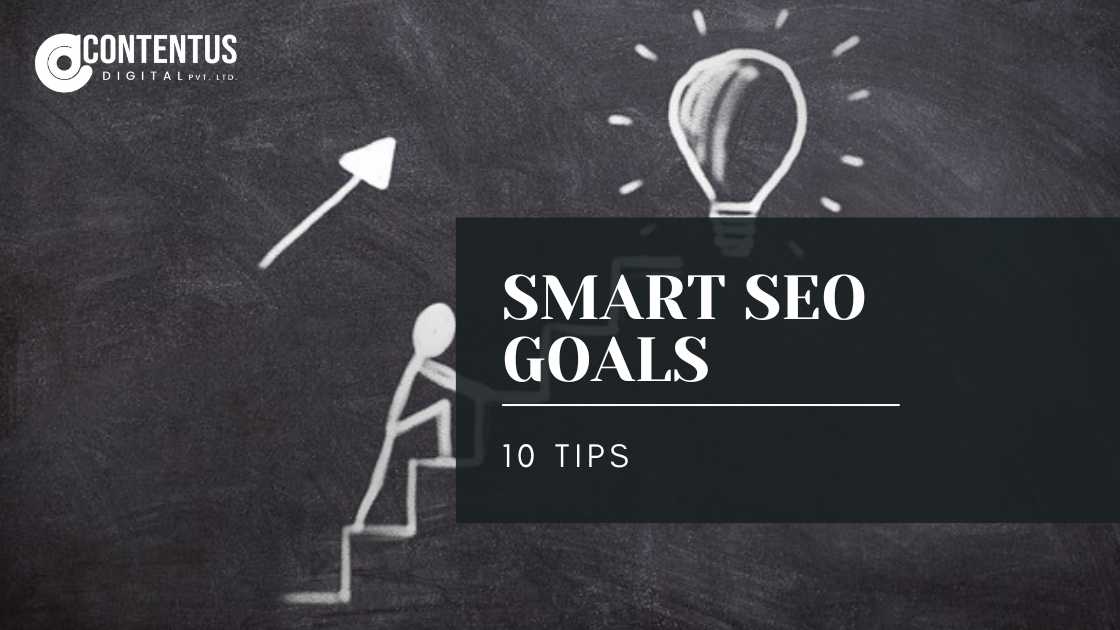Blog Details

18 August
smart seo goals 10 tips
Smart SEO goals are nothing but a set of directions to your success. It will assist you to strive more strategically to reach your target. What differs from an intelligent goal to any common goal is that the former is more specific, target-oriented, realistic, achievable and easy to measure.
For example, if you want to increase more organic traffic, you need a proper strategy to make your site more visible to your readers.
However, how you choose to set your SEO goals can help you determine ROI on your SEO investment. There is a sharp difference between understanding smart goals and implementing them on your website. Only a professional with sound knowledge of SEO can help you figure out your goals as per your affordability. Here are a few trending SEO tips to get your desired result to ease your effort.
10 Tips to Get More Traffic
Write Catchy Headlines
Headlines are an essential part of your content. Writing a compelling headline is exceptionally crucial to get your readers’ attention. In addition, a good headline increases the click-through rate of your content. Therefore, one of the most critical smart SEO goals is to master headline writing.
There are several ways to write SEO-friendly headlines. They are:
- Use Keywords in Your Headlines
- Focus on the Target Audience
- Use Power Words
- Maintain An Ideal Length
- Use Numbers
A short and focusing on the target audience headlines are so irresistible. You can read it faster and quickly comprehend the outcomes of reading the rest of the content.
Focus on On-Page SEO as Smart SEO Goals
Optimizing your content for on-page SEO is not difficult nor time-consuming. However, it can help you boost the traffic you need for your site. On-Page SEO optimization can help search engines crawl your website faster. It also helps your readers get your content on top of SERP when they search online. As a result, Google helps your content appear more relevant to your readers’ eyes and get clicked.
The main elements of On-Page SEO are:
- Information-rich content
- Meta Title and Meta Description Optimization
- Optimize Alt-Image
- Slug Optimization
- Internal & External Linking
- Structured Markup
Once you finalize your smart SEO goals, implement these requirements on your site or hire a professional to do these for you.
Use More Long-Tail Keywords
Long-tail keywords have low search volume, but a high conversion rate makes it easy for intense competition. Moreover, as these keywords state a clear message to your target audience, SEO professionals find it easy to rank content. According to Backlinko’s analysis of 308 million keywords, 91.8% of all search engine queries are long-tail keywords. Furthermore, it is also suitable for voice search optimization.
Here are a few ways to find long-tail keywords as smart SEO Goals:
- Google’s Auto Suggestions
- Using Various Keyword Researching Tools
- Take the Help of Google Analytics
- Search on Q&A sites such as Quora
- Research on Competitors’ Sites
Long-tail keywords are more conversational, and they focus on studying Natural Language Processing(NLP) and user intent. Therefore, it is better to use them often as your ranking strategy.
Write Guest Blogs
Guest posts have tons of benefits, starting from the quality backlink building, and bringing in new audiences to increase brand awareness, increasing online authority and more. According to SEMRush, 53% of online marketers think guest blogging is the most effective way to build your backlink profile.
With guest posting, you can grow your audience on social media, improve SEO performance, get more leads and prospects and more. When you write a guest post, keep in mind a few suggestions such as:
- Writing long-form and information-rich content.
- Optimization for on-page SEO.
- Use of license-free images and graphs to make the content more acceptable.
- Provide external links to your other guest posts in the same domain.
- Link internally to your host publisher’s other articles.
Most importantly, track your posts’ performance from time to time using tools like Ahrefs etc. Making smart SEO goals means you can assess how much progress you have and how far you need to strive more, and using a tracking tool is such.
Optimize Your Content for Snippets
Featured snippets are the exact content that answers your queries. You can find it in the first organic results on SERP or, more precisely, on the ‘position 0’. The benefits of getting your content displayed in the featured snippet mean higher exposure and lead you can attract. The most common and popular among the various snippets are Paragraphs, lists and tables.
The advantages you can expect are voice search optimization and getting some clicks from the page ranking number 1, and you gain to become a trusted expert.
To optimize the featured snippet, you need to follow the steps below:
- Conduct keyword research and aim for question-type search queries.
- Research on competitors’ websites.
- Find content ideas in the People Also Ask section.
- Maintain an ideal word count.
- Add a ‘How to’ section to your website.
- Use high-quality images and videos.
According to Hubspot, content with featured snippets gets 2 times more click-through rates than those that don’t optimize snippets.
Provide Internal Links
One of the smart goals for SEO is using proper internal links in your website. Internal links will allow your readers to swiftly navigate through your website, spreading the link juice equally throughout the website, keeping your readers engaged in your site; Google’s crawling becomes easy and more.
Here are a few internal links building strategies that you can follow:
To create internal links on your website, make plenty of content. Conduct keyword research and use relevant and natural internal links on your site. Also, ensure that you use a reasonable number of internal links on your site.
Make Your Site Responsive
It is unequivocally vital to make your site responsive as one of the smart SEO goals. Furthermore, it is crucial to make your site structurally and visually responsive every time to attract your visitors.
The setback of not having a responsive site may cost you losing your valuable readers. For example, 61% of users said they never go back to websites that are not mobile-friendly. With responsive designs, you can provide a smooth user experience to your readers and reduce bounce rates.
To make your site responsive, pay attention to a few things that may be beneficial, such as image size, layout, theme, etc.
Use Social Media
One of the goals of SEO is to make your site visible to the target audience, and social media can help you achieve your desired outcome. In addition, it can drive traffic to your site organically.
You can optimize social media with the following tips:
- Figure out your social platform goals. Having a goal in mind can help you achieve that quickly. Use social handles to reach your audience in a better way, increase your engagement with your prospects, generate potential leads and ROI.
- Build your profile by uploading a high-quality image and letting people know about your services, adding location and hour of service. Use relevant keywords to make your profile more searchable.
- Create relevant content that adds value to your clients with the help of infographics, images and videos.
- Add some CTA or make offers and discounts.
- Use catchy eye headlines and make short and lucid content.
Improve Page Loading Speed
Page loading speed is vital to online users as faster pages provide an excellent user experience. If your page takes more than 3 seconds to load, there is an increased chance of bounce rate.
You can reduce the delay on your page loading using a few measures. For example, use adaptive images, use the cache, compress your content, simplify Java scripts and CSS to make your page easy to load and increase the dwell time of each visitor.
Conduct Competitor Analysis
Consider competitor analysis is one of the vital SEO goals and objectives as it can help you rank higher, get good traffic and increase ROI. Start with identifying your competitors in SEO, assess keyword difficulties, check their content length backlinking sources. You can also scrutinize their site structure and UX designs. Moreover, take a look at their social media posts and figure out why they are getting good traffic.
There are many tools available online to conduct competitor analysis like Ubersuggest, SEMRush, Ahrefs etc. However, using these tools requires in-depth knowledge of SEO. Hence, resorting to a professional SEO agency can save your time and effort.
3 Reasons To Optimize Search Engine
Apart from driving traffic, there are other reasons to have smart SEO goals.
They are:
Brand Value Creation
It would help build your brand with your target audience by creating awareness. SEO helps consumer participation and interaction with your brand. You can ensure that your site is accessible with an ideal link structure. Google considers high-quality links valuable for your content to rank. Good Contents are like bridge between clients and your brand.
Online Reputation Management
SEO mainly focuses on SERP and the keyword performances of your content. Also, online reputation management builds trust, improves search engine rankings, attracts positive returns. It can make or break your business. It builds credibility as most people like to buy from brands they can trust.
Lead Generation
If you want a higher conversion rate, a promising lead generation in an SEO campaign can help. You can use A/B testing to convert your clients into your potential leads. In addition, you can inform your readers about what they can get if they fill up the form and submit it. You can also distribute PDF books on your preferred niche to get their mailing IDs.
FAQs
- Why My Website Don’t Get Traffic?
If you don’t get traffic even after all the tried SEO methods, you must have ignored your website’s UX. If you don’t have a user-friendly site, no one will stay on your website for a longer time.
- How Can I Get Google Traffic On My Site?
Use the search engine optimization-starter guide to get Google Traffic on your site. This can help you improve your website’s performance through search. Also, you can use Google Ads to boost site traffic.
- How to Improve My SEO Strategy?
The principal goal of SEO is to increase traffic on the site. However, SEO is not all about hard and fast rules. Instead, you need to apply various tricks and assess which one works better.
- How to Generate Traffic on My Website for Free?
Social media is a great tool to get traffic to your website for free. With the help of social platforms, you can reach your target audience and attain your desired smart SEO goals.
- Can I Increase Web Traffic Without SEO?
Social media is the solution if you don’t want to use SEO but increase web traffic. But social media alone cannot help. Instead, use content marketing techniques to augment web traffic without SEO.
- How Can I Plan Keywords for SEO?
Search intent plays an essential role in keywords planning. There are various tools available in the market that conduct keywords research. As per your affordability, choose free or paid tools.
- What Are the Three Main Elements of SEO?
3 main elements of SEO are site navigation, the URL and internal linking. However, there are other elements that you need to work on to drive more traffic to your site.
- What is the Most Important Pillar of SEO?
SEO is balanced on the 3 most essential pillars: discovery, relevance, and authority. However, from a different angle, the 3 pillars of SEO are On-Page, Off-Page & Technical. Working on these smart SEO goals can help you achieve visibility, drive traffic and increase profit. You can set your target, assess your achievement, and perform better with these. SEO is one of the essential parts of digital marketing. Without the help of SEO, it isn’t easy to rank on SERP. So take your business to the next level with the use of SEO.












